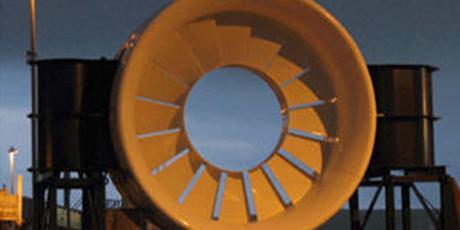By Wayne Thompson NZ Herald 5:30 AM Tuesday Feb 8, 2011
More than half a billion dollars will be spent on sinking tidal power turbines to the seabed of the Kaipara Harbour after the approval of New Zealand's first tide-driven power station.
But the Environment Court has set conditions of consent for the project after a year of mediation among four objectors.
The key requirement for applicant Crest Energy is two years of environmental monitoring and evaluation and starting with only three turbines.
The company wants to sink up to 200 turbines off the harbour mouth in a $600 million plan to harness the swift tidal flow to power homes from Albany to Cape Reinga.
It appealed to the court in 2008 when Northland Regional Council allowed only 100 turbines to be sunk.
On Thursday, a final decision was issued by the court, Judge Laurie Newhook and commissioners Ross Dunlop and David Bunting.
They sought to overcome concerns about effects on the North Island's west coast snapper stocks and survival of the rare Maui's dolphin.
Heavy-duty changes to earlier draft conditions were made and they insisted on an adaptive management style for the project to ensure effects were no more than minor.
Crest's evidence was that the project would have no adverse effect on either the snapper fishery or Maui's dolphin breeding, nursing or feeding and that the dolphins rarely ventured into the Kaipara.
The conditions say if results with three turbines satisfy the Northland Regional Council, the company can add up to 17 turbines, provided operation of the 20 turbines is monitored for a year to give sufficient information on the impact on fisheries.
From there, the council will decide whether to allow turbines to be built up in further stages from 20 to 40, then 80 and then to a maximum of 200.
The director-general of conservation wanted the company to monitor operations for three years between going from 20 turbines to 40.
Iwi-based objector Environs Ltd wanted consent refused altogether or at least three years of monitoring after finishing each stage.
Judge Newhook said Crest and the parties worked co-operatively to resolve key issues.
He said the proposal was "very significant in terms of its contribution to power generation and the national economic interest". There was no basis to accept Environ's appeal that the term of consent should be for 10 rather than 35 years, he said.
Crest Energy director Anthony Hopkins last night expressed delight and said the company was now awaiting the consent of the Conservation Minister.


Comments